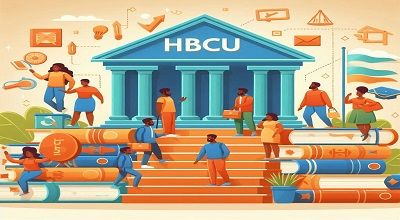HBCUs
HBCU stands for Historically Black Colleges and Universities. These are institutions of higher education in the United States that were established primarily to serve the African-American community. HBCUs have a rich history dating back to the 19th century. When they were founded due to racial segregation and limited educational opportunities for Black Americans.
HBCUs played a significant role in providing access to higher education for Black students during time. When they were often excluded from predominantly white institutions. These institutions have made significant contributions to American society in various fields. Including education, science, technology, business, politics, and the arts.
There are over 100 HBCUs in the United States, and they continue to play an essential role in promoting diversity, equity. And educational opportunities for students of all backgrounds. Although they predominantly serve Black students.
What role play Hbcu?
Historically Black Colleges and Universities (HBCUs) play several important roles in American society and the education system. Some of the key roles they play include:
- Expanding Access to Higher Education: HBCUs were established during a time when racial segregation limited educational opportunities for Black Americans. They have historically provided access to higher education for Black students. Who might have otherwise been excluded from predominantly white institutions?
- Promoting Diversity and Inclusion: While HBCUs predominantly serve Black students. They have always been open to students of all racial and ethnic backgrounds. They promote diversity and inclusion in the educational landscape, fostering an environment. Where students from various backgrounds can come together to learn.
- Cultivating a Strong Sense of Community: HBCUs often have close-knit and supportive communities. Where students, faculty, and staff develop strong relationships. This sense of community can be especially valuable for students. Providing them with a supportive network during their college years and beyond.
- Preserving Cultural Heritage: HBCUs have played a significant role in preserving and celebrating African-American culture and history. They often offer programs and courses focused on African-American studies, contributing to a deeper understanding of this cultural heritage.
- Producing Leaders and Professionals: HBCUs have a track record of producing leaders and professionals in various fields. Including education, science, technology, business, politics, and the arts. Many successful and prominent individuals have graduated from HBCUs and have gone on to make significant contributions to society.
More Read…
- Addressing Socioeconomic Disparities: HBCUs can help address socioeconomic disparities by providing quality education to students from underserved communities. Graduates of HBCUs often have a strong commitment to giving back to their communities. Which can contribute to positive social change.
- Research and Innovation: HBCUs engage in research and innovation in various fields. Contributing to advancements in science, technology, and other areas. They often focus on addressing issues that disproportionately affect minority communities.
- Fostering Leadership and Activism: HBCUs have been centers for activism and social justice movements. They have played a crucial role in fostering leadership and activism among their students. Empowering them to advocate for civil rights and social change.
Overall, HBCUs have a multifaceted role in American society. Encompassing educational access, cultural preservation, community building, and the development of leaders and professionals. Who contribute to the broader community and address social and economic challenges.
Benefits & Disadvantages Of HBCU
Historically Black Colleges and Universities (HBCUs) offer unique advantages and face some challenges. Just like any other type of educational institution. Here are some of the benefits and disadvantages associated with HBCUs:
Benefits of HBCUs:
- Cultural Connection: HBCUs provide a culturally rich and supportive environment for Black students. This can contribute to a strong sense of identity, belonging, and pride.
- Strong Sense of Community: HBCUs often have close-knit communities. Where students, faculty, and staff form strong relationships and support one another.
- Access to Higher Education: HBCUs have historically played a critical role in providing access to higher education for Black students. Who may have faced discrimination? And limited opportunities at predominantly white institutions.
- Quality Education: Many HBCUs offer rigorous academic programs and have dedicated faculty who are committed to student success.
- Leadership Development: HBCUs have a track record of producing leaders and professionals who have made significant contributions to various fields.
- Cultural Preservation: HBCUs often have strong programs in African-American studies. Contributing to the preservation and celebration of African-American culture and history.
- Research and Innovation: HBCUs engage in research and innovation, often focusing on issues that disproportionately affect minority communities.
- Diversity and Inclusion: While predominantly serving Black students, HBCUs are open to students of all racial and ethnic backgrounds. Promoting diversity and inclusion in the educational landscape.
Disadvantages of HBCU:
- Financial Challenges: Many HBCUs face financial challenges, which can affect their ability to offer competitive salaries to faculty. Provide state-of-the-art facilities, and offer scholarships to students.
- Limited Resources: Some HBCUs have limited resources for research and may lack access to cutting-edge technology and facilities.
- Perceptions of Quality: There can be negative perceptions of HBCUs in terms of educational quality. However, this perception is not always accurate, as many HBCUs offer high-quality education.
- Limited Networking Opportunities: Some students may feel that attending a predominantly Black institution limits their exposure to diverse perspectives and networking opportunities.
- Underrepresentation in Certain Fields: HBCUs may have limited resources and programs in certain fields. Potentially limiting opportunities for students interested in those areas.
- Challenges in STEM Fields: While some HBCUs excel in STEM education. There can be challenges in terms of resources and representation in STEM disciplines.
- Competitive Admissions: As HBCUs gain recognition for their quality education. They can become more competitive, making it more challenging for some students to gain admission.
Last Words
It’s important to note that the experiences and outcomes of students. At HBCU can vary widely from one institution to another. The advantages and disadvantages listed here are general trends and may not apply uniformly to all HBCUs. Ultimately, the choice to attend an HBCU. Or any other type of institution should be based on individual goals, preferences, and circumstances.
